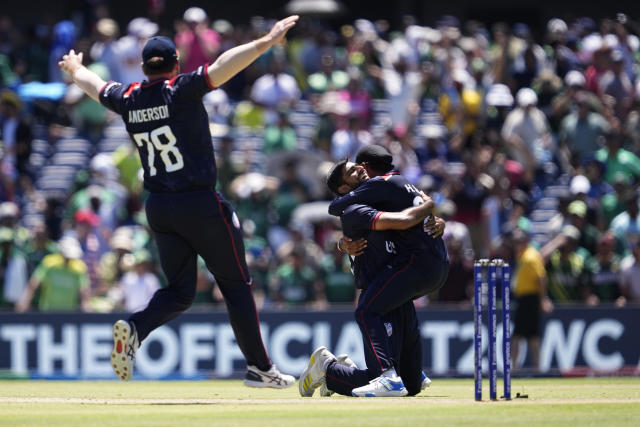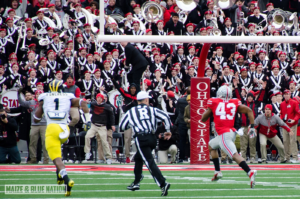I was unaware that the Cricket World Cup was one, happening, and two, in America, until last week. A Jomboy TikTok popped up. Instead of spreading Astros conspiracy theories, he was doing something (commentary? lip readings?) for whichever provider streams it. As you may notice, I did not refer to it as the T20 World Cup. Because up until today I was fully unaware that limited cricket was even a thing. I had even seen a TikTok (my go-to cricket source, apparently) about the US beating Canada. I thought the T20 was “U20”, and assumed the US had some great cricket prospects.
At this point, everyone knows what happened – the US beat Pakistan in cricket. From my very limited cricket knowledge, I knew Pakistan is very good, along with India, Australia, and England (score some facking runs Engurlan). Again, until yesterday I was under the impression that there was one form of cricket. And so, when I did a YouTube search on T20 rules, and the first thing was about an “over”, I had to start from the beginning. I’m pretty well-versed in most sports too; half my blogs are “soccer is cool” and “we should hang everyone associated with Manchester City.” This is all to say, I think .001pc of Americans care about cricket. Americans had just been beefing with the world on whether baseball was cooler (spoiler: it is).

In the celebration, I took some time to compare this to the quintessential American victory – the Miracle on Ice. And as I searched on Twitter for someone to talk about it. I only found a few accounts even mentioning the movie, let alone the real event. At first, I thought this was the new Miracle on Ice. But the more I thought about it, the less I believed that.
Wicket Wicket USA*
I’d like to point out at the beginning of this section that cricket is disturbingly British. A lot of the terminology in cricket feels like words we make up to make fun of the Brits (i.e. oi the bowler gaggled the wink in the yorker and stumped the batswain. There are real cricket terms in there). So as I write this, not only did we beat Pakistan, we beat England too (like we did in the World Cup; a draw is a win for us).
Everyone and their mother has a take on the victory at this point. But no one is pointing out how crazy this entire situation is, by comparing it to the biggest miracles in US sports. You can show me the Miracle in Minneapolis. You can show me the Iron Bowl returned FG. Crazy enough, you can even show me FDU beating Purdue. But none of these come close to the Miracle on Ice. If you look up US sporting miracles, it’s always number one. And for a reason.
Looking at the victory yesterday, and the Miracle on Ice Team, winning in cricket is even crazier. Supposedly, the US is ranked 18th. They have played 14 matches and I don’t believe they even had funding up until this year. Because, again, America does not care about this sport. Cricket is like tenth in American popularity in terms of games played with bats and balls; I think Pickleball is eighth. I have seen cornhole on ESPN played with members of the Denver Broncos; cricket is never on television. This is all to say America isn’t even trying to play cricket. A team member is more concerned with your cloud solutions than pickleball.
A team of elite professionals lost to a bunch of guys balancing their 9-5.
This team is a hodgepodge of players. Sure, I’d imagine there are tryouts and other functionalities in place to find the best players. But there are no systems in place like we have for our biggest sports. There’s not an American Jon Rothstein of cricket creating catchphrases — “Monank Patel, the America’s Six Man.” These are guys with day jobs who had to request PTO off through a portal. What did they put? Representing my country in sport? Or the more appropriate “vacation”? Because they beat the sixth-best team in the world from one of the fourth major nations that excel at the sport. And Pakistan was playing with the best player in, at least, Pakistan, Babar Azam.
I watched the highlights (on TikTok because the ICC makes horrible highlights), and it’s like watching an even match. What’s not been spoken about is we used fewer batters to reach the 159 runs during regular overs (is that how you say it?). Legitimately, America is beating that team in regular cricket. There is something so beautiful about a bunch of guys coming together to be like, yes America is great at sports. It genuinely is the craziest thing I have ever seen in sports.
And the super over (extra innings) was incredibly clutch. I’d like to imagine that the US’s ability to actually play intimidated Pakistan to the point they continually made errors.
All this to say – it’s called baseball now.
US Miracles
As much as it seems people believe that this will spur cricket in America, it really won’t. It’s really cool. But the victory is just not all that important, even for someone like me who loves sport. Cricket is the second most popular sport in the world, but I would argue it’s very region-specific. And if there’s one thing the US really loves, it’s not caring about the rest of the world. That makes cricket a contender for “baseball is better.”
That’s one of the reasons why the Miracle on Ice is so much more important to America than the cricket victory can ever be. Hockey is probably a contender for the fourth most popular sport in America, ranging into second depending on regionality. There are systems in place to train players from a very young age to the NHL. It is a well-known timeline. So even if the 1980 team were a bunch of amateurs, they had been given the infrastructure since birth to play hockey and get to that collegiate level. The cricket team is balancing playing while also living as a normal American adult.
Everything I’m going to say next still makes the Miracle on Ice a miracle. But the Miracle on Ice is much more calculated than the storytellers would have you think. Herb Brooks was on a mission when he started the recruitment process for the 1980 team. He knew that to win the gold he had to beat the Russians. And, so, he created a team to beat the Russians. On the first day of tryouts, the players didn’t even try out; Brooks already knew his team. This wasn’t some miracle. It was the plan. The way he coached, the way he trained, the way he pushed his players was all for a singular goal – to beat the Russians. It was a calculated kill. Which, to me, makes it even cooler.

There’s also the added backdrop of the Cold War. I don’t see a need to waste a paragraph explaining the Cold War. The semifinal in the 1980 Olympics was not just team against team. The game was country against country while America and Russia were actively pointing nuclear warheads at each other. The importance of the game was quadrupled by the emotional stakes. Most adults watching the game remembered the Cuban Missile Crisis. The players probably had some memories of the Crisis and had to do nuclear drills in school. The USSR was not the enemy on the ice, they were the enemy from birth.
To everyone at the game, to everyone who watched the game that evening, this was not just a win for a hockey team. It was a win for the American psyche. The win was similar to seeing a soon-to-be Soviet President walk around an American grocery store. As cool as beating Pakistan is, even as it is the craziest US victory of all time, it can never match that importance.
None of this is meant to take away from the achievement of the American cricket team. This wasn’t David and Goliath. This was David versus three Goliaths in a trench coat. I also don’t want to call it a miracle, because it wasn’t a miracle. The game was won by 11 guys who went out and did everything they could, and did it so well they cemented themselves in the American psyche (obligatory: dudes rock).
No matter if you agree, remember: America is always better at the sport. And if we aren’t, it’s because we just don’t care enough. RAHHHH.
*This is a reference to Landon Donovan’s goal at the 2010 World Cup.
Follow Moon Stamp Sports on Twitter/X, Instagram and Facebook, and follow Jorden on Twitter/X. Check out other blogs by Jorden.






Your writing radiates excitement — wonderful job!
This is exactly the energy I needed today!
I felt the excitement building as I read — fantastic job!
Your content is consistently insightful and inspiring.
You always leave readers better informed — thank you!